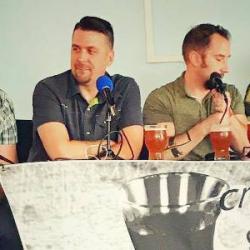This weekend I preached on the suffering servant passage in Isaiah 53. I talked about the people in our world who “bear our infirmities and carry our diseases,” comparing them to Frodo Baggins, the Hobbit who carried the ring of doom to be destroyed in the lava in Lord of the Rings. I will be in Texas for the next several days and will be taking a break from the blog, so peace be with you. Here’s the audio for the sermon:
My dad is a cholesterol doctor. Sometimes it can get annoying at mealtimes. “Wow, somebody has a big appetite! Would you like me to ask the waiter for a box? You could put half that burrito in there and eat it tomorrow for lunch.” “No, Dad, I want the whole burrito and I want it loaded with sour cream and guacamole and grease and fat.”
My dad has a lot of faith in willpower. He’s sort of like the Dr. Phil of the Duke Lipid Clinic. He tries to help people understand that they don’t have to smoke, they don’t have to get seconds at the all-you-can-eat buffet, they don’t have to drink sugar-loaded soft drinks all day.
But there’s one type of patient my dad sees that really troubles him: people who are doing everything right health-wise but they’ve been shafted by their genes. He told me about a patient named Elise whose genes caused her immune system to attack her joints and other parts of her body, leaving her wheelchair-bound, diabetic, and with severe cholesterol problems. Despite all these problems, she was bright, funny, and talented. She performed in her school chorus show in a motorized scooter and got a standing ovation. Elise would die in her mid-twenties of kidney disease and liver failure.
The story of Elise and others like her really haunted my dad so he wrote an essay three years ago comparing these patients with genetic disorders to Frodo Baggins, the hobbit who carries the ring of doom in the Lord of the Rings. The way my dad explained it is that our genome pool as a human race is going through a constant process of mutation. Human beings do not have the same genes that they did 2000 years ago; we have evolved, albeit in very small, incremental ways.
This process of mutation ends up benefiting our species as a whole, but it means that some people end up drawing the short straw through no fault of their own and they become the ringbearers for the human species. Like Frodo Baggins carried the ring of doom on behalf of all of Middle Earth, they bear our infirmities and carry our diseases. It’s completely unfair; we shouldn’t put the blame on God; it just happens.
Back in ancient times, when people were born with deformities or diseases, the assumption was that God was punishing them. Imagine the added weight of not only suffering from a debilitating disease but having other people in your community consider you unclean and cursed because your body looks like it is being punished.
The reason we don’t make those presumptions anymore about those who suffer in our world is partly because of the chapter in Isaiah that we just read. It forever changed the way that the Israelites understood suffering, which they’ve passed on to all of their cultural descendents like us. See, for much of the Old Testament, there was a running debate. Places like the book of Proverbs were saying that those who work hard and praise God appropriately will be rewarded with a prosperous life, while other places like the book of Job said no, bad things happen to good people who work hard and do all the right things, and it’s wrong to say that God is punishing them.
So then Isaiah 53 comes along and says, “Guess what? The great king that we’ve been awaiting for centuries. He’s going to suffer not because of anything bad that he did, but because of our sins. He will be crushed for our iniquities and not only that, somehow his suffering will make us whole and bring us healing.”
This prophecy from Isaiah is the most decisive piece of the Hebrew Bible that prepared the way for Jesus. See, the way the Bible works is that God used everything that happened to the Israelite people before Jesus came along to create a theological context in which Jesus could make sense when He came. One of my corny jokes that I always tell about my two sons Matthew and Isaiah is that there’s a lot of Isaiah in Matthew. There is a whole lot of Isaiah in Matthew, Mark, Luke, and John. Jesus quotes the book of Isaiah more than any other book in the Old Testament.
Because Jesus came to an Israelite people who had been tossing around Isaiah 53 for centuries, when He was betrayed by His people and put on trial and nailed to the cross by a perversion of justice, He was living out this prophecy. And that’s why later when Simon Peter preached His first sermon in the Jerusalem temple, 3000 Jewish people came forward to be baptized that day, because they had read Isaiah 53 and they could say, “Wow, it was him. The guy Isaiah was talking about. We despised and rejected him. We made his grave with the wicked. And he’s our Messiah!”
And yet there’s more to this than to just a prophecy. The words are haunting; they speak of neglect and regret. They should confront and convict us of the way we too have participated in the rejection of our suffering messiah.
Last weekend at our Virginia annual conference, the Cambodian pastor Romy del Rosario who visited our church preached an incredible sermon that I am continuing to digest. One of the things he said is that love is not love until it becomes flesh and dwells among us. I’ve been thinking about this phrase and how it applies to our response to Isaiah’s prophecy about Jesus. It’s a bit abstract to feel sorry for ignoring and rejecting Jesus; we weren’t there; it happened two thousand years ago. But maybe Jesus wants us to see Him in other people who suffer.
Until we get to heaven, we can’t give Jesus a hug; we can’t touch the nail holes in His hand and feet. But there are people He loves and wants us to love for His sake who bear our infirmities and carry our diseases. And He wants us to notice them and spend time with them because spending time with Jesus in our time with the ringbearers of our world is a means of His grace and a source of eternal life. I’m not talking about heaven, but living right now today with a grasp of what really matters, liberated from all the idols and anxieties that we thought were important.
I’ll never forget Holy Week, 2011, which I spent in the ICU at Fairfax hospital where Nick Franca, a kid from our church, lay dying of cancer. Instead of a crown of thorns and nail holes, he had heart monitors and IV ports. I only got to speak with Nick one time when he was alive, but it was one of the most eternal conversations I’ve had in my life. When people whose bodies are broken are fighting to live, they teach the rest of us how to live in a way that is eternal.
There’s a five year old boy named Vincent Alexander who’s in Fairfax hospital right now with brain cancer. The chemo caused him to have seizures which made his brain swell and took away his vision. It’s coming back, but he still couldn’t really see me when I went to visit him. And yet when I asked how he was doing, he said, “Oh, I’m doing great, Pastor,” and had this big old grin on his face. That kid is my hero. I pray for him every day and what I tell God is “Do something that doesn’t make any biological sense so that people will be amazed and give you glory.”
Because of what Jesus went through, we can see people like Nick and Vincent as heroes who teach us how to live. He wants us to spend time with them not as an obligatory good deed, but in order to be taught, not just people who are sick, but people who are outcasts, people who have really embarrassing secrets, people who are judged by the world. And here’s the other side of this. By allowing Himself to be despised and misjudged, Jesus is saying to the people who feel cursed, ignored, or mistreated, I see you and I’m right there with you.
So if you’re one of the precious ringbearers of our world, if you feel like Frodo Baggins stumbling towards Mt. Doom with a weight that is dragging you into the ground, know that part of Jesus’ mission in being the rejected messiah is to show the world that you too are a hero. He’s walking with you just like Samwise Gamgee walked with Frodo. You may stumble; but he will not let you fall in the lava. If you are a ringbearer, then you have a sacred mission for the rest of us: show us how to live with dignity; show us how to be eternal; show us how to lift our crosses up and follow Jesus.















